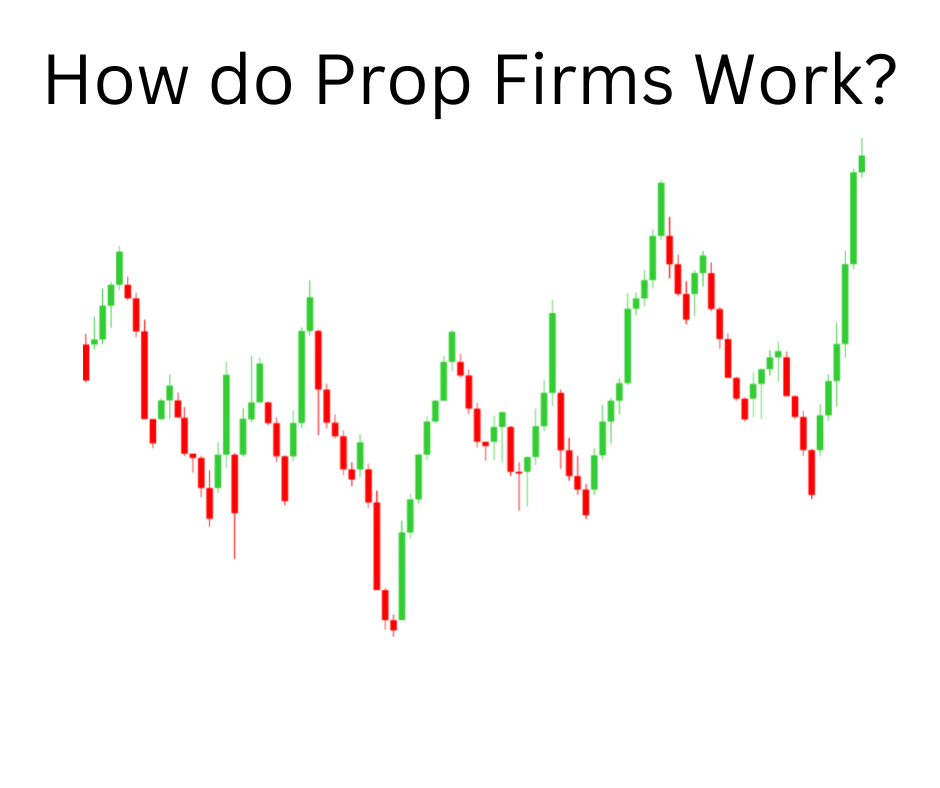As someone who has personal experience in the world of prop trading, I can tell you that it’s an exciting and potentially lucrative industry. In this article, we’ll explore how prop firms work, how they make money, and how you can get involved. So, let’s dive right in!
How Does a Prop Trading Firm Work?
A proprietary trading firm, or prop firm, is a company that trades financial instruments, like stocks, bonds, and commodities, with its own capital. The primary goal of a prop firm is to generate profits by speculating on market movements.
The traders at these firms don’t trade on behalf of clients; instead, they use the firm’s money to make trades, aiming to make a profit for the company and themselves.

Can prop firms make you rich?
Prop firms can definitely make you rich if you’re a talented trader and can consistently generate profits. Most prop firms have a profit-sharing model, which means that traders receive a percentage of the profits they generate. This can lead to substantial earnings for successful traders. However, it’s important to remember that trading is inherently risky, and not everyone will make money.
How do prop firms make money?
Prop firms make money primarily through the profits generated by their traders. These firms employ skilled traders who use various trading strategies to exploit market inefficiencies and generate profits. Some prop firms may also charge traders fees for access to their trading platform, technology, or other services.
Starting a Prop Firm Business
Starting a prop firm requires a solid understanding of the financial markets, substantial capital, and a team of talented traders. Here are some key steps in starting a prop firm business:
Determine your niche: Identify the markets and financial instruments you want to focus on, such as equities, options, or forex.
Develop a business plan: Outline your objectives, target market, revenue model, and operational structure.
Raise capital: Secure the necessary funding to start your business, either through personal savings, investors, or loans.
Build a team: Hire experienced traders with a proven track record, as well as support staff like analysts and risk managers.
Invest in technology: Purchase or develop a high-quality trading platform, along with any other necessary software and tools.
What is the prop firm business model?
The prop firm business model is based on generating profits from the trades executed by its traders. These firms provide their traders with the capital, technology, and resources needed to execute trades. In return, the firm takes a percentage of the profits generated by the traders. Some prop firms may also charge fees for access to their trading platform or other services.
Are there any prop firm exams?
While there are no specific exams for joining a prop firm, many firms require their traders to pass the Series 7 and Series 63 exams administered by the Financial Industry Regulatory Authority (FINRA). These exams are necessary for traders to become licensed to trade securities in the United States.
Prop firm statistics
Prop firms are a significant part of the global trading landscape. According to industry estimates, proprietary trading firms account for about 70% of the trading volume on major stock exchanges. These firms employ thousands of traders worldwide and generate billions of dollars in profits each year.
Where do prop firms get their money?
Prop firms typically get their money from a variety of sources, including personal savings of the founders, private investors, and institutional funding. Some prop firms also raise capital by charging their traders fees for access to their trading platform or other services.
How To Join a Prop Trading Firm
Joining a prop trading firm can be a great way to launch your trading career. Here are some steps to help you join a prop firm:
Research potential firms: Identify reputable prop firms that specialize in the markets and financial instruments you’re interested in trading.
Develop your skills: Enhance your trading knowledge and skills by studying the markets, practicing with a demo account, and learning from experienced traders. Many prop firms require a solid understanding of technical and fundamental analysis.
Prepare your resume and trading record: Highlight your relevant experience, education, and trading performance in your resume. A strong track record can be a significant advantage when applying to a prop firm.
Apply and network: Submit your resume to prop firms, and use networking events and social media to connect with professionals in the industry. This can help you stay informed about job openings and improve your chances of getting hired.
Ace the interview: Be prepared to discuss your trading strategies, risk management, and market knowledge during the interview process. Some prop firms may also require you to take a trading test or complete a trial period before offering a position.
How Do Prop Traders Make Money Using Proprietary Trading Firms?
Prop traders make money by using the capital provided by the prop firm to execute trades and generate profits. The firm then shares a portion of these profits with the trader, typically through a profit-sharing arrangement. The exact percentage of profits that a trader receives can vary widely between firms and may depend on factors like the trader’s experience, performance, and the firm’s policies.
Why are Prop Trading Firms So Profitable?
Prop trading firms are often highly profitable for several reasons:
Skilled traders: Prop firms hire talented traders who have a proven track record of success. These traders use their knowledge and expertise to capitalize on market opportunities and generate profits.
Advanced technology: Prop firms invest heavily in cutting-edge trading platforms, algorithms, and other tools that give them a competitive edge in the market.
Diversification: Prop firms typically trade a wide range of financial instruments and employ various trading strategies, which helps to diversify risk and improve overall performance.
Risk management: Prop firms have strict risk management policies in place to protect their capital and minimize losses.
What Are the Risks Involved with a Proprietary Firm?
While prop trading can be lucrative, there are also risks involved:
Trading losses: Since prop traders trade with the firm’s capital, significant losses can negatively impact the firm’s bottom line and potentially result in the trader losing their job.
Market volatility: Rapid market fluctuations can lead to unexpected losses, even for experienced traders.
Regulatory risk: Prop firms are subject to regulations and oversight by financial authorities, which can affect their operations and profitability.
Economic downturns: A weak economy or financial crisis can lead to reduced trading opportunities and lower profits.
Proprietary Trading Careers: Right for You?
A career in prop trading can be rewarding and challenging. It might be a good fit for you if you have a strong interest in the financial markets, possess analytical and decision-making skills, and thrive in a fast-paced, high-pressure environment. However, it’s essential to weigh the potential rewards against the risks and consider the competitive nature of the industry.
Prop Trading Interviews: What to Expect
During a prop trading interview, you’ll likely be asked about your trading experience, strategies, and risk management techniques. Be prepared to discuss specific examples of trades you’ve executed and the rationale behind your decisions. Some firms may also administer a trading test or require you to complete a trial period before offering a position.
Prop Trading Vs Retail Trading
Prop trading and retail trading differ in several ways:
Capital: Prop traders trade with the firm’s capital, while retail traders use their own money.
Technology and resources: Prop firms provide their traders with advanced trading platforms, tools, and support, which may not be readily available to retail traders.
Profit-sharing: Prop traders typically receive a portion of the profits they generate for the firm, whereas retail traders keep all their profits.
Risk management: Prop firms have strict risk management policies in place, while retail traders are responsible for managing their own risk.
Regulatory requirements: Prop traders may be required to pass licensing exams and comply with industry regulations, while retail traders face fewer regulatory hurdles.
How Do I Become a Prop Trader as a Beginner?
If you’re new to trading and want to become a prop trader, here are some steps to follow:
Education: Learn about financial markets, trading strategies, and risk management through books, online resources, and courses.
Practice: Open a demo account with a reputable broker to practice your trading skills and develop your strategies without risking real money.
Networking: Connect with experienced traders and industry professionals through online forums, social media, and networking events to gain insights and advice.
Apply for internships or junior positions: Many prop firms offer internships or entry-level positions that can provide valuable experience and help you transition into a full-time trading role.
Continuously improve: Stay up-to-date with market trends, refine your strategies, and learn from your mistakes to become a better trader.
Is Prop Trading Worth It?
Prop trading can be a rewarding career for the right individuals. It offers the potential for high earnings, access to advanced trading tools and resources, and the opportunity to learn from experienced traders. However, it also comes with risks, such as the possibility of losing your job due to poor performance, high stress, and a competitive environment. Ultimately, whether prop trading is worth it depends on your personal goals, risk tolerance, and passion for the financial markets.
How Much Money Do You Need To Be A Prop Trader?
As a prop trader, you don’t need your own capital to trade, as the prop firm provides the necessary funds. However, some prop firms may require you to contribute a small amount of capital as a sign of commitment or as a security deposit. This amount can vary between firms, so it’s essential to research the specific requirements of the prop firms you’re interested in.
How Do Prop Traders Make Money?
Prop traders make money by executing trades using the capital provided by their prop firm. Their primary goal is to generate profits for the firm by capitalizing on market opportunities and implementing effective trading strategies.
Prop traders typically receive a portion of the profits they generate, often through a profit-sharing arrangement. The exact percentage can vary between firms and may depend on factors like experience, performance, and the firm’s policies.
Conclusion
Proprietary trading firms offer a unique opportunity for skilled traders to access significant capital, advanced technology, and a supportive environment for trading.
However, the industry is competitive, and the risks can be substantial. If you’re considering a career in prop trading, take the time to carefully weigh the pros and cons and commit to continuous learning and improvement. By doing so, you’ll be better prepared to navigate the exciting world of prop trading and potentially achieve great success.
